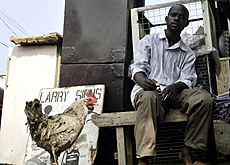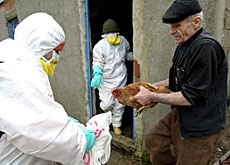Swiss on alert over African bird flu case

The Federal Veterinary Office tells swissinfo that the discovery of the deadly bird flu virus in Africa is also cause for concern in Switzerland.
Spokeswoman Cathy Maret said new measures, similar to a previous outdoor ban for poultry, are being considered because Switzerland lies on the south-north bird migration route.
Nigerian and international authorities announced on Wednesday that the deadly bird flu strain H5N1 had been detected on a poultry farm in northern Nigeria.
The virus originated in Asia and has since spread to Europe’s borders.
No human infections have been reported in Nigeria, but 40,000 birds have died. Nigeria has ordered the quarantine and culling of any fowl suspected of carrying the virus and has imposed restrictions on animal movements.
swissinfo: Bird flu has been found in Nigeria, is it the same strain as that has affected Asia?
Cathy Maret: We know that it’s the H5N1 virus. But we are not sure that it’s the same strain as in Asia. We’ll have to wait a few days for the genetic tests to confirm whether it’s really the same virus or a new virus.
If it turns out to be the same virus, then we’ll have to say it’s bad news and a bad omen for the future.
swissinfo: Will Swiss experts be going to Nigeria?
C.M.: No, but the World Health Organization is sending some experts over. They are going to assess the situation from the field, to find out if there are several outbreaks and what measures have been taken.
swissinfo: If the strain is the same as in Asia, what are the implications for Switzerland?
C.M.: That would change things. It’s a new situation, because Africa is on the south-north bird migration route.
As these birds cross Switzerland, we’re going to have to re-evaluate our measures. By the end of February, beginning of March, we’re going to evaluate whether we need to confine domestic fowl indoors again. This is because bird migration starts at this time.
We’ll also have to look into whether we should reinforce our [bird flu] surveillance programme. All these points will be discussed in light on the information that will be sent to us by the experts in Nigeria, in collaboration with our experts.
swissinfo: How concretely is Switzerland affected by the African bird flu case?
C.M.: In spring migratory birds pass over Switzerland on their way back from Africa. They fly from the south to the north in the direction of Scandinavia and Russia.
It’s a shorter migration than in autumn and it concerns fewer birds. Furthermore, the birds are much faster and don’t necessarily stop in Switzerland, they just cross over.
The danger is perhaps less acute than in autumn. Despite this, we are going to have to re-evaluate the situation.
swissinfo: How probable is it that measures similar to those introduced last autumn will be taken?
C.M.: I don’t want to speculate. One thing is certain: a decision will be taken by the end of February.
swissinfo-interview: Pierre-François Besson
From October 26 to December 16 last year, the autumn migration period, Switzerland banned the keeping of domestic poultry outdoors.
Veterinary experts took samples from 800 migratory birds, but found no trace of bird flu.
Switzerland also banned imports of poultry products from affected countries and airport checks have been stepped up. Anti-flu drug Tamiflu has been stockpiled to treat a quarter of the Swiss population.
Experts have said that a bird flu outbreak in Africa could be more serious than the one in Asia, given Africa’s lack of diagnostic and surveillance infrastructure.
Since the beginning of the bird flu scare, 165 human cases of the virus have been reported.
There have been more than 80 deaths, mainly in Asia.
Most victims had close contact with domestic fowl.
Seven countries have reported human cases of bird flu: China, Vietnam, Cambodia, Indonesia, Turkey, Iraq and Thailand.

In compliance with the JTI standards
More: SWI swissinfo.ch certified by the Journalism Trust Initiative


You can find an overview of ongoing debates with our journalists here. Please join us!
If you want to start a conversation about a topic raised in this article or want to report factual errors, email us at english@swissinfo.ch.